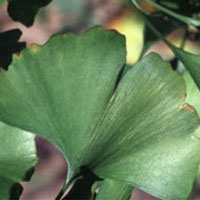health guides
Ginkgo
 © Steven Foster
© Steven FosterHow It Works
The medical benefits of Ginkgo biloba extract are attributed primarily to two groups of active constituents: the ginkgo flavone glycosides and the terpene lactones. Ginkgo flavone glycosides, which typically make up approximately 24% of the extract, are primarily responsible for ginkgo’s antioxidant activity and may mildly inhibit platelet aggregation (stickiness). These two actions may help ginkgo prevent circulatory diseases, such as atherosclerosis, and support the brain and central nervous system.1 In addition to the cardiovascular system, ginkgo’s anti-oxidant action may also extend to the brain and retina of the eye.2 Preliminary trials have suggested potential benefit for people with macular degeneration3 and diabetic retinopathy.4 The terpene lactones found in ginkgo extracts, known as ginkgolides and bilobalide, typically make up approximately 6% of the extract. They are associated with increasing circulation to the brain and other parts of the body and may exert a protective action on nerve cells.5 ginkgo regulates the tone and elasticity of blood vessels,6 making circulation more efficient.7
Ginkgo is also well-known for its effect on memory and thinking (cognitive function). It may enhance cognitive performance in healthy older adults,8 in people with age-related cognitive decline, and in people with Alzheimer’s disease.
How to Use It
Most clinical trials have used between 120 and 240 mg of ginkgo (standardised to contain 6% terpene lactones and 24% flavone glycosides) per day, generally divided into two or three portions.9 The higher amount (240 mg per day) has been used in some people with mild-to-moderate Alzheimer’s disease, age-related cognitive decline, intermittent claudication, and resistant depression. Ginkgo may need to be taken for eight to twelve weeks before desired actions such as cognitive improvement are noticed. Although nonstandardised Ginkgo biloba leaf and tinctures are available, there is no well-established amount or use for these forms.
Copyright © 2024 TraceGains, Inc. All rights reserved.
Learn more about TraceGains, the company.
The information presented by TraceGains is for informational purposes only. It is based on scientific studies (human, animal, or in vitro), clinical experience, or traditional usage as cited in each article. The results reported may not necessarily occur in all individuals. Self-treatment is not recommended for life-threatening conditions that require medical treatment under a doctor's care. For many of the conditions discussed, treatment with prescription or over the counter medication is also available. Consult your doctor, practitioner, and/or pharmacist for any health problem and before using any supplements or before making any changes in prescribed medications. Information expires December 2024.


 We are proud to announce that
We are proud to announce that  As the market evolves, customers increasingly request a wider variety of omega-3 options for their lipid...
As the market evolves, customers increasingly request a wider variety of omega-3 options for their lipid...  Maintaining healthy glucose levels is crucial for preventing metabolic conditions like diabetes,...
Maintaining healthy glucose levels is crucial for preventing metabolic conditions like diabetes,...  Looking at formulating a new vitamin blend? Discover
Looking at formulating a new vitamin blend? Discover 







































